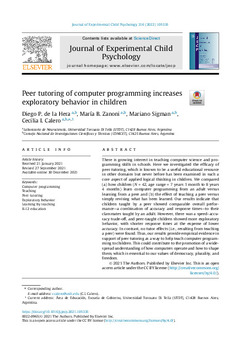| dc.rights.license | This is an open access article under the CC BY license (http://creativecommons.org/licenses/by/4.0/). | es_AR |
| dc.contributor.author | de la Hera, Diego P. | es_AR |
| dc.contributor.author | Zanoni, María B. | es_AR |
| dc.contributor.author | Sigman, Mariano | es_AR |
| dc.contributor.author | Calero, Cecilia | es_AR |
| dc.date.accessioned | 2022-11-23T12:49:03Z | |
| dc.date.available | 2022-11-23T12:49:03Z | |
| dc.date.copyright | © 2021 The Authors. Published by Elsevier Inc. | |
| dc.date.issued | 2022 | |
| dc.identifier.issn | 0022-0965 | |
| dc.identifier.uri | https://repositorio.utdt.edu/handle/20.500.13098/11432 | |
| dc.identifier.uri | https://doi.org/10.1016/j.jecp.2021.105335 | |
| dc.description.abstract | There is growing interest in teaching computer science and programming
skills in schools. Here we investigated the efficacy of
peer tutoring, which is known to be a useful educational resource
in other domains but never before has been examined in such a
core aspect of applied logical thinking in children. We compared
(a) how children (N = 42, age range = 7 years 1 month to 8 years
4 months) learn computer programming from an adult versus
learning from a peer and (b) the effect of teaching a peer versus
simply revising what has been learned. Our results indicate that
children taught by a peer showed comparable overall performance—
a combination of accuracy and response times—to their
classmates taught by an adult. However, there was a speed–accuracy
trade-off, and peer-taught children showed more exploratory
behavior, with shorter response times at the expense of lower
accuracy. In contrast, no tutor effects (i.e., resulting from teaching
a peer) were found. Thus, our results provide empirical evidence in
support of peer tutoring as a way to help teach computer programming
to children. This could contribute to the promotion of a widespread
understanding of how computers operate and how to shape
them, which is essential to our values of democracy, plurality, and
freedom. | es_AR |
| dc.format.extent | 1-18p. | es_AR |
| dc.format.medium | application/pdf | es_AR |
| dc.language | spa | es_AR |
| dc.publisher | Journal of Experimental Child Psychology | en |
| dc.rights | info:eu-repo/semantics/openAccess | es_AR |
| dc.subject | Computer programming | es_AR |
| dc.subject | Teaching | es_AR |
| dc.subject | Peer tutoring | es_AR |
| dc.subject | Exploratory behavior | es_AR |
| dc.subject | Learning by teaching | es_AR |
| dc.subject | K-12 education | es_AR |
| dc.title | Peer tutoring of computer programming increases exploratory behavior in children | es_AR |
| dc.type | info:eu-repo/semantics/article | es_AR |
| dc.type.version | info:eu-repo/semantics/publishedversion | es_AR |

